Women's Euro 2017: How England became the 'fittest team' at Euro 2017
- Published
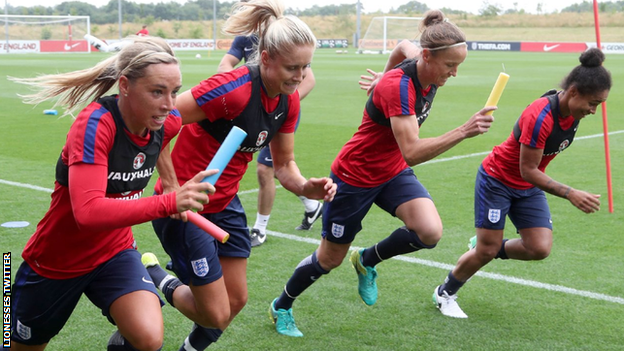
England open their European Championship campaign against Scotland on Wednesday
Women's Euro 2017 on the BBC |
|---|
Host: The Netherlands Date: 16 July-6 August |
BBC Coverage: Selected live commentaries on BBC Radio 5 live, Scotland games on Radio Scotland and online, plus live text coverage on the BBC Sport website. |
When a new fitness coach started working with England before the Women's World Cup in 2015, he was "shocked" by how little strength and conditioning work was being done amongst the squad.
Ben Young, who had worked in rugby union with Saracens and England, was drafted in as an assistant before England's historic third-place finish in Canada.
Immediately, he knew how quickly he could improve the overall condition of the squad. "There were so many easy wins," he said.
Now, as England prepare for a European Championship for which they are one of the favourites, he says the squad's fitness has improved by 23% since August, adding weight to Sampson's claim his side will be the fittest in the Netherlands.
But how did Young make so many gains so quickly, and will it impact on England's performance as they begin their campaign against Scotland on Wednesday?
'Compared to hockey, we were so far behind'
According to Sampson, and players such as Karen Bardsley and Casey Stoney, England have never looked leaner or more defined.
Players are lifting weights three or four times a week - pictures on the FA's Twitter account show full-back Demi Stokes lifting 135kg - body fat percentages have dropped, and post-training speed runs have been so gruelling, players have been wracked with anxiety even before taking part. "They are gruelling and just horrible," says Stoney.
A sea change has occurred. And it was necessary, according to Sampson, who admits his side would "run out of legs" in games and suffered in the World Cup because they had "so many players carrying knocks".
Young knew he could improve speed and injury reduction through a better strength programme, but he needed to supply the players with evidence so they would buy into what he was attempting.
So he tapped into data used by the Great Britain and United States hockey teams to see how their fitness compared. As Sampson told BBC Sport: "We were so far behind."
Young tailored the system, in which players would take 10 fitness tests - measuring everything from speed to power - to reach an individual fitness score. Those scores would then be added together to measure the overall fitness of the team.
Young also created four measures: world-class, future England, current England and below standard. These showed players where they needed to improve.
"Within the first three months, we had 76 personal bests in the squad," he told BBC Sport. "There was massive room for improvement, but the players bought into it and we've gone from the majority of the squad in the 'current England' bracket to 40% of them pushing or within 'world-class' standards."
Lionesses' Group D fixtures (All kick-off at 19:45 BST) |
|---|
Scotland - Wed 19 July, Utrecht |
Spain - Sun 23 July, Breda |
Portugal - Thu 27 July, Tilburg |
Smashing through the brick wall
Young, who had never previously worked in women's sport, says he initially encountered a brick wall when trying to convince players and clubs about his methods. As Stoney said: "People don't like change."
But, over time, all parties bought into the shift in culture, and Young says the relationship between clubs and country is now more "harmonious".
Part of the problem was England training was a lot more physically intense than at club level.
"We've had to work with clubs to ensure their programmes are close to ours so it's not such a shock when players join England camps," said Sampson.
To bridge that gap, Young mimicked other sports, such as basketball, where players can top up different aspects of their fitness.
"The weights and fitness culture was already on the back burner, and when you chuck in a few games, it falls by the wayside," he said. "But you look at the NBA, where they play four games a week and do lifts before and after a game.
"My experience in the year beforehand was not to go anywhere near the players two days before a game, because they want to be fresh, but if you're always trying to be fresh, then you can't work them to capacity or improve them. Now we can, and the clubs have helped us do this."
As part of that culture shift, Young has tried out new techniques in the build-up to England games. Rather than spend a relaxed day before an evening kick-off, he has introduced what he calls a "priming session" at which, five hours before kick-off, players will meet to do explosive activities - such as using a watt bike, jumps or weights - for 30 minutes.
"The players don't feel tired during the game, it's completely the opposite," Young added. "They feel energised and up for it. You're trying to create a hormone spike so they are ready for action and it's used a lot in other sports like rugby union."
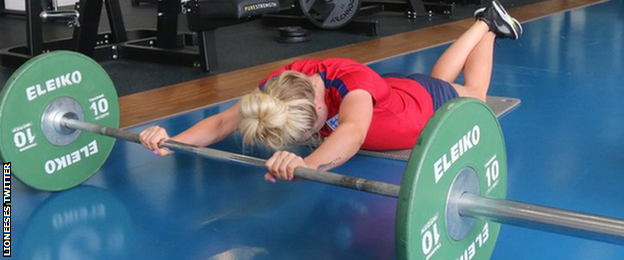
How will it help?
Debate has long raged in rugby union about whether too much time in the gym can leave players short on developing their skills, but Sampson believes his team can match any of their rivals on a technical level.
Of more concern at Euro 2017 is the fact England could play six games in 19 days - and players could become fatigued. Young and Sampson have worked together to create training sessions during which technical and tactical aspects can be delivered at a high intensity, and games have been organised against England youth teams.
"I had to demonstrate to Mark that the training sessions were a lot less intense than games, but by putting constraints on games like getting the ball back in play within three seconds, we increase the intensity by 40%," Young said. "If we do that for 10 minutes, during the last few minutes the players are making decisions under fatigue, which helps for tournament time."
Sampson added: "Whatever happens in football, speed, power, and aerobic endurance are always going to be important. There will always be races and physical duels and whoever wins the majority of them will give themselves a foothold in the game.
"So we decided that part of our DNA is our physical fitness and our ability to outwork opponents. We want a team that can stop defensive problems at source, which means pressing high up the pitch at the right times. And when we get the ball, we want to do things quickly so they can't be defended."
If anyone can handle the pressure, it's us - Duggan
Can England improve on 2015 World Cup?
England are among the favourites for the European Championship, but for all the talk about how their World Cup victory over Germany would catapult them into the top tier of football, they have not beaten either the European champions or France in six subsequent outings.
They won bronze in Canada after a psychological and social evolution in the squad, with players encouraged to share their personal stories and what motivated them. The thinking was if you knew what your team-mate had been through, you'd be more likely to run that extra yard for her.
This time, England have had a physical evolution, but questions remain about their technical capabilities.
"I wouldn't say England are the strongest technical team in possession at the Euros, but they more than make up for that in their physical and mental capabilities," said former England goalkeeper Rachel Brown-Finnis. "What Sampson has done in the last three years in terms of the psychological conditioning is far more likely to make an impact than anything else."
Sampson is not one for style over substance, and prides himself on building a side that can adapt to every scenario.
"I don't get paid to play entertaining football," he said. "I couldn't look my players in the eye if we played a good game and lost."
Winning is all that matters, and by adding to their mental fortitude with a stark physical improvement, Sampson can genuinely say his team have the tools to go the distance.
England more talented than ever - Sampson
- Published15 July 2017
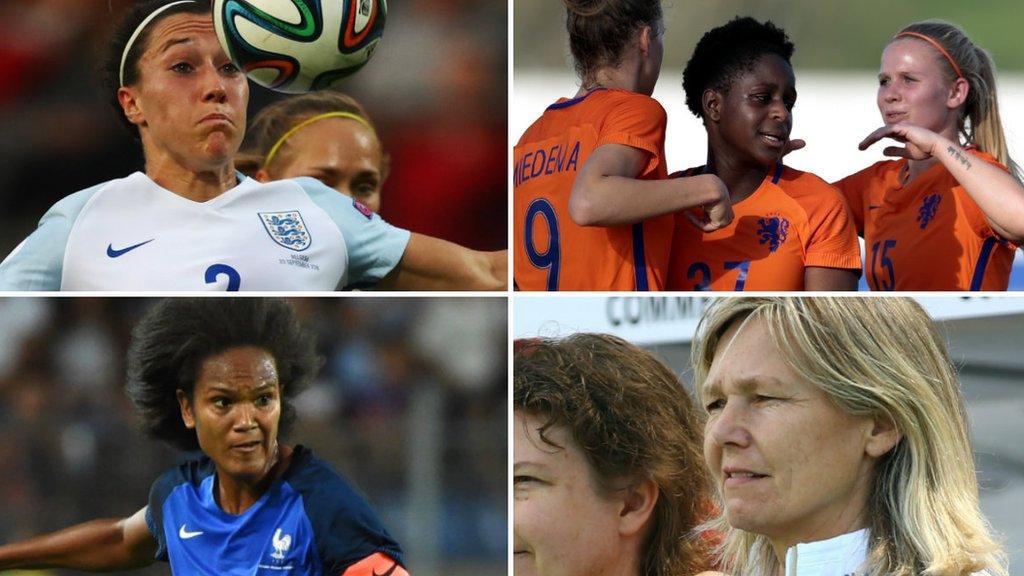
- Published14 July 2017

- Published8 November 2016
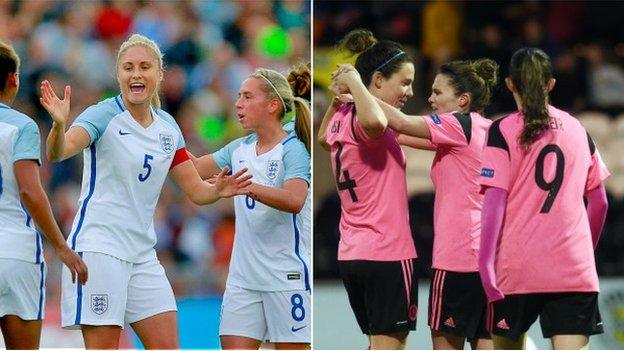
- Published16 July 2017
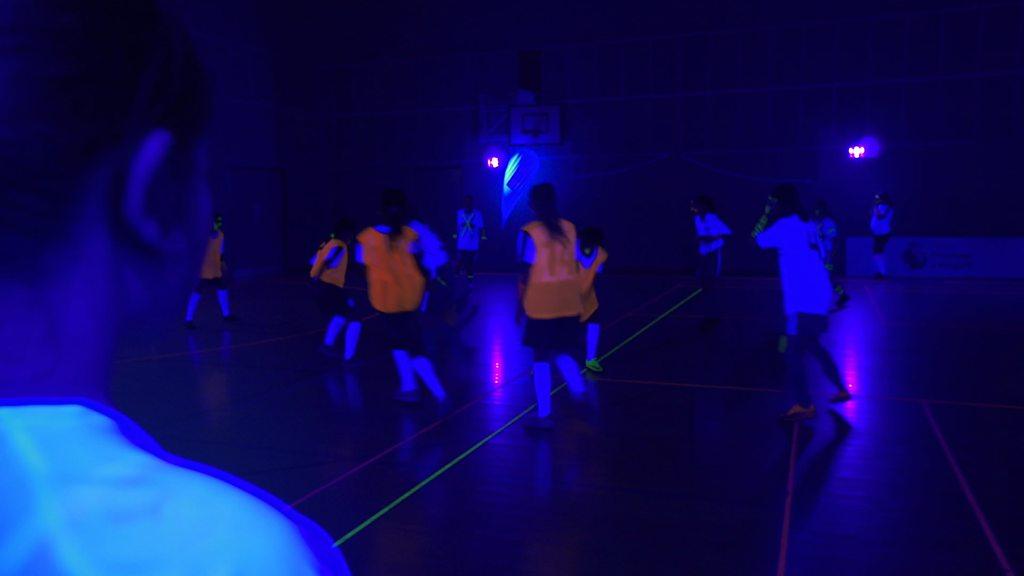
- Published7 June 2019
